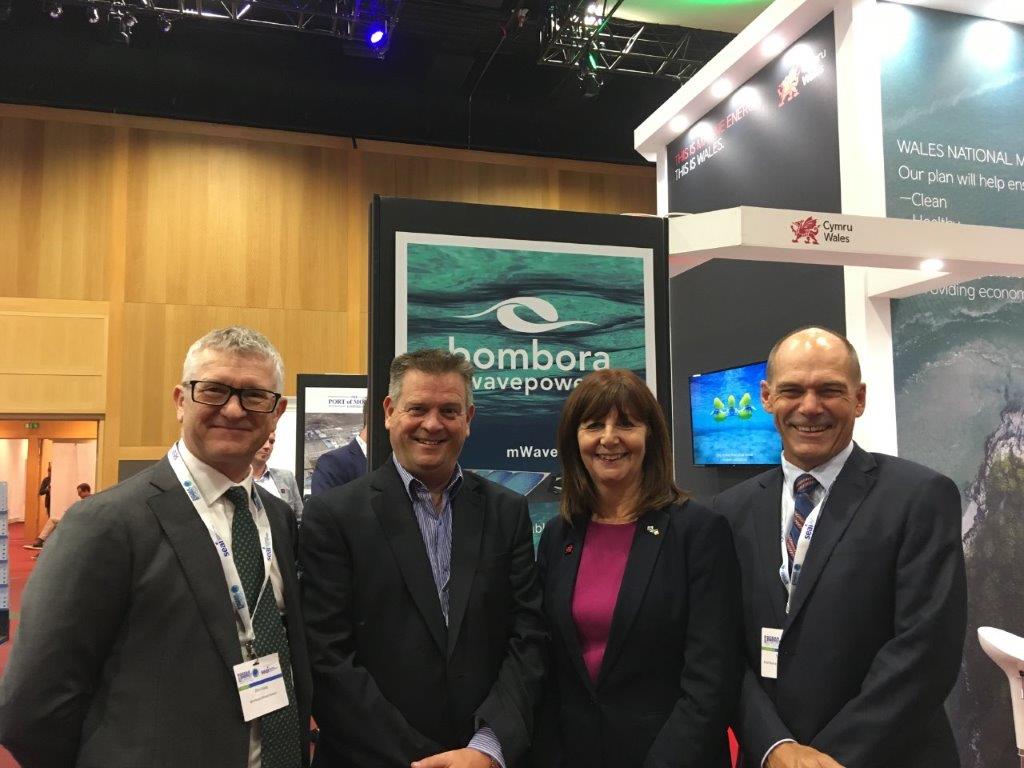Full Consent Granted to Deploy and Test the World’s Most Powerful Wave Energy Device in Welsh Waters
Bombora has received the green light for both its on-shore and off-shore licence applications for the deployment and testing of their mWave™ wave energy technology off the coast of Pembrokeshire, Wales. This is the first Marine Licence to be granted for a wave energy device in Wales.
Lesley Griffiths, the Minister for Environment, Energy and Rural Affairs said,
“I am pleased Bombora has received a marine licence to deploy and operate the first wave device in Welsh waters. This is a significant step forward for the industry and our journey towards a low carbon future for Wales. Renewable energy is an integral part of our vision for a more sustainable future. Following our declaration of a climate change emergency, it is more important than ever projects such as Bombora’s wave energy converter are realised.
“The First Minister and I have met with Natural Resources Wales to ensure we maximise opportunities to improve the planning process helping us to realise our potential to lead the way on marine energy.
“I hope we can learn from this project and how it interacts with the marine environment to further develop our understanding and the renewable industry in Wales for the benefit of all.”
Bombora is currently mid-way through its project to design, build, deploy, test and validate a 1.5MW mWave wave energy converter. In 2018 Bombora secured a £10.3 million European Regional Development Fund grant through the Welsh Government to support its Pembrokeshire mWave Demonstration Project.
Securing the required consents in a reasonable timeframe is a critical requirement for all marine energy projects.
Project Manager, Madeline Cowley commented, “Devices need to be tested in open ocean environments to validate their performance and offshore operations processes. We are very pleased with the thorough and timely approach adopted by Natural Resources Wales in processing our consent applications. This reflects Wales’ strong commitment to the marine energy sector and will attract other developers to the region”.
Rhian Jardine, Head of the Development Planning and Marine in Natural Resources Wales (NRW) said:
“NRW is committed to doing all we can to tackle the climate emergency including supporting the deployment of renewable energy projects while ensuring the sustainable management of the marine environment.
“We have been working with Bombora Wave Power Europe Limited on their Wave Energy Converter proposal in East Pickard Bay, Pembrokeshire.
The marine licence and EIA Consent decision has now been successfully granted for the project by NRW’s Permitting Service, determined within 5 months of formal submission.”
Collaborating closely with the “Marine Energy Test Area” (META) through Marine Energy Wales and the Pembrokeshire Coastal Forum has enabled Bombora to navigate and expedite the consents.
“This is another important milestone in Bombora’s plans to deploy their innovative low carbon wave energy technology. It is great to see continued progress with their project plans and we are delighted to have supported the company since the decision to set-up their European headquarters in Wales” said David Jones, Director of Marine Energy Wales.
Bombora is pressing ahead with plans for wave parks across Europe. The first of these is a 2MW project in Lanzarote, Spain.
The mWave deployment in Pembrokeshire will be carefully monitored to confirm the environmental footprint of the wave energy converter. This information will form a critical element of Bombora’s future wave park project consenting applications.
mWave is fully submerged under the sea and is non-disruptive to ocean users and marine life. These design elements, in addition to its innovative cell membrane technology, set mWave apart from other wave energy devices by delivering minimal visual and environmental impact.
– ENDS –
For further information, please contact:
Notes to editor:
About Bombora and mWave™
Bombora has developed a membrane style wave energy converter called an ‘mWave™’. Located 10 meters beneath the ocean’s surface, similar to a fully submerged reef, it is invisible from the shoreline. As ocean waves pass over mWave, the membranes deflect pumping air through a turbine to generate electricity. Electricity is directly transferred to shore via a submerged cable.
mWave is unique among wave energy converters as it simultaneously addresses the ‘cost of energy’ and ‘ocean wave survivability’ challenges.
Bombora is currently completing a 1.5MW mWave product validation project in Pembrokeshire, Wales with the support of the Welsh Government and a European Regional Development Fund (ERDF) grant. Bombora is simultaneously developing a global pipeline of commercial wave farm projects.

L to R: Philip Hale, Business Development Manager Bombora, Chris Williams Commercial Manager Bombora, Leslie Griffiths Minister for Environment, Energy and Rural Affairs and Sam Leighton Managing Director Bombora.
